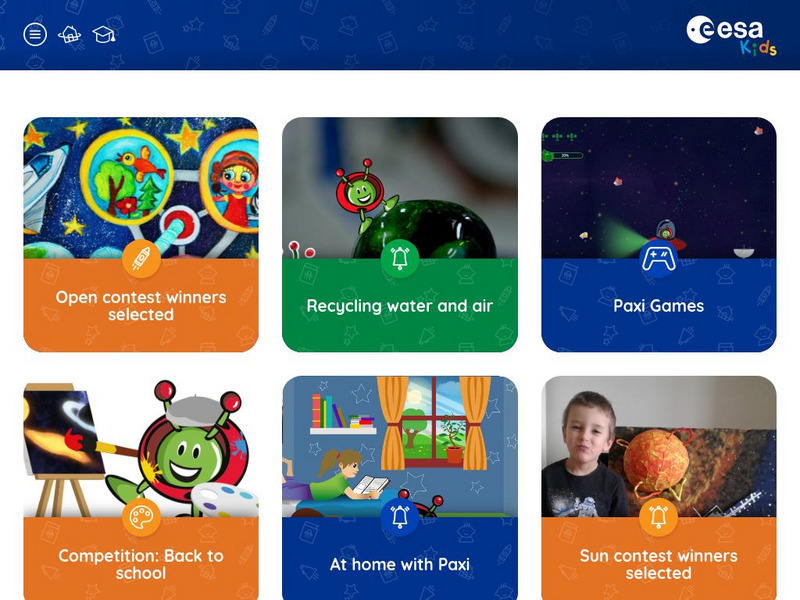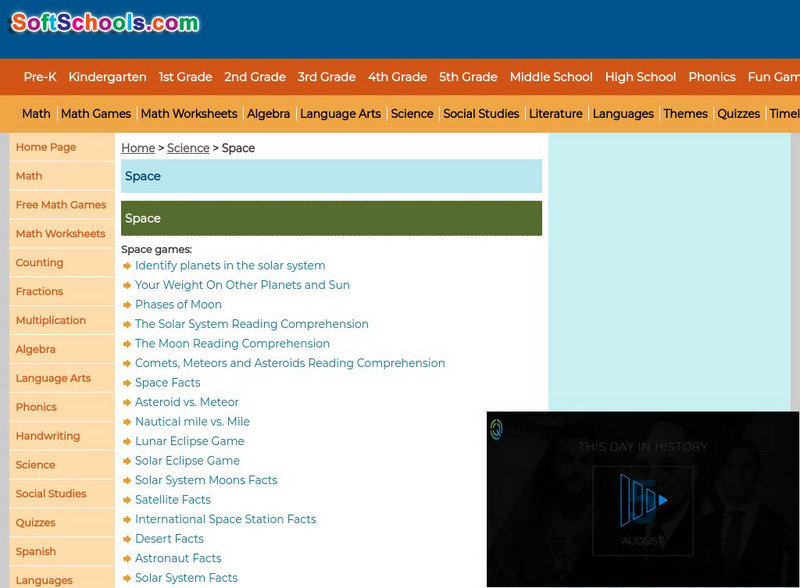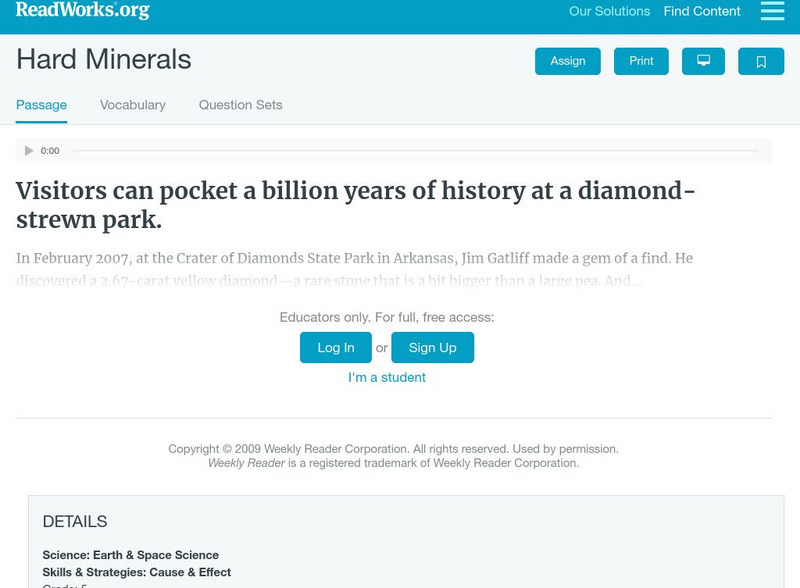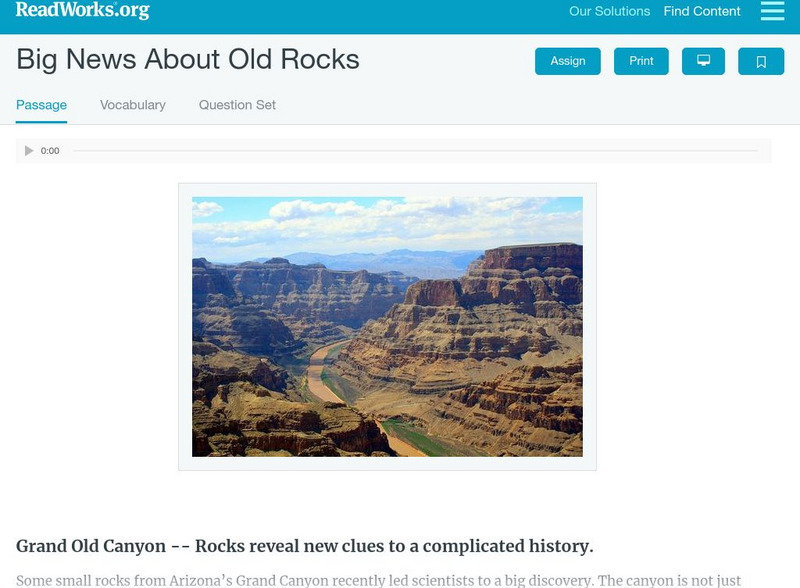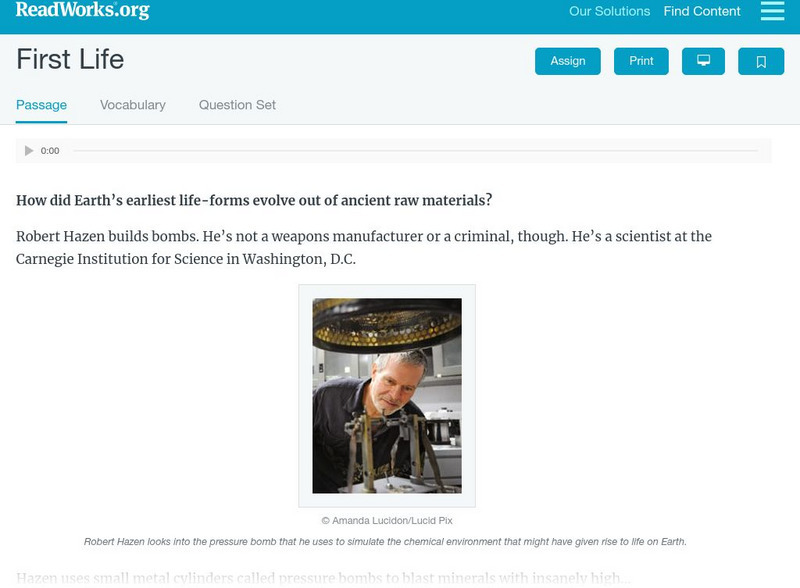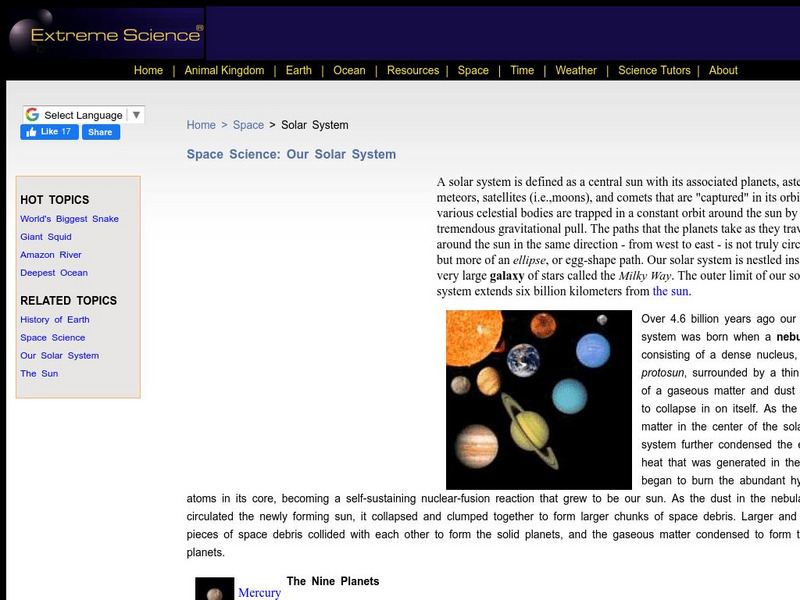Hi, what do you want to do?
Other
Elementary Science Program: Astronomy, Gr. 5 8
"Astronomy is the science that studies the Earth, the Moon and other objects in space. It has helped us discover our place in the physical universe. It is still making discoveries." This landing page gives options for students and...
European Space Agency
European Space Agency: Story of the Universe
The story of the universe is told in this engaging site by the European Space Agency. The history of European space science is timelined with dates ranging from 1066 to present day. The birth of galaxies, the big bang, and the beginnings...
European Space Agency
European Space Agency: Esa Kids
Multilingual site with articles, news. images, games, and activities about the universe, life in space, the Earth, space exploration, and related topics.
Read Works
Read Works: A Hole in the Planet
[Free Registration/Login Required] An informational text about the layers of the Earth and a place near the Canary Islands where there is a hole in the crust. A question sheet is available to help students build skills in reading...
Read Works
Read Works: Cracking Up
[Free Registration/Login Required] This passage shares information about crevices in the earth and earthquakes.This passage is a stand-alone curricular piece that reinforces essential reading skills and strategies and establishes...
CK-12 Foundation
Ck 12: Earth Science: Life Cycle and Classification of Stars Study Guide
[Free Registration/Login may be required to access all resource tools.] This study guide summarizes key points about types of stars and he life cycle of a star. Includes a few questions to check for understanding.
Soft Schools
Soft Schools: Space: Solar System Interactives
Identify the planets in our solar system and discover how much you weigh on another planet with these space interactives.
PBS
Pbs Learning Media: Exploring Environmental Change
Students explore the connections that can exist in a natural environment, and examine how changes to the environment, particularly those caused by human activity, can affect those connections.
Concord Consortium
Concord Consortium: Stem Resources: Evaporative Cooler
Build an air conditioner in this activity using a washcloth, coat hanger, aluminum pan, and three-speed fan. After constructing the air, students will measure the air, water, and wet cloth temperature as well as measuring the humidity....
Concord Consortium
Concord Consortium: Stem Resources: Relative Humidity Measurement
Using the wet bulb-dry bulb method, students will compare the temperature of a dry temperature sensor and a wet temperature sensor. By comparing the temperatures, students will be able to find the relative humidity. After completing the...
NASA
Nasa Space Place: Do a Science Fair Project!
Your science fair project may do one of three things: test an idea (hypothesis), answer a question, and/or show how nature works. Learn the steps involved in a project and get some great topic ideas.
TeachEngineering
Teach Engineering: Mission to Mars
The Mission to Mars curricular unit introduces students to Mars-the Red Planet. Students discover why scientists are so interested in studying this mysterious planet. Many interesting facts about Mars are revealed, and the history of...
Read Works
Read Works: Dig This!
[Free Registration/Login Required] Students read different fossils, how fossils are made, and three different types of rock on Earth. A question sheet is available to help students build skills in comparing and contrasting.
Read Works
Read Works: Hook, Line, and Sinker
[Free Registration/Login Required] An informational text about the depletion of edible seafood populations. A question sheet is available to help students build skills in reading comprehension.
Read Works
Read Works: Hard Rocks
[Free Registration/Login Required] Students read about hunting for gem stones including diamonds, rubies, emeralds, and more. A question sheet is available to help students build skills in cause and effect.
American Geosciences Institute
American Geosciences Institute: Earth Science Week: Rock Around the World
Classes from around the country collect rock samples and send them in to be analyzed by NASA scientists.
Read Works
Read Works: What Is Heat?
[Free Registration/Login Required] An informational text about heat and how it is transferred from one object to another. A question sheet is available to help students build skills in reading comprehension.
Read Works
Read Works: Big News About Old Rocks
[Free Registration/Login Required] An informational text about rocks in the Grand Canyon and how they give clues about the past. A question sheet is available to help students build skills in reading comprehension.
Read Works
Read Works: Not Scared, Prepared
[Free Registration/Login Required] An informational text about different people and organization that help during an emergency. A question sheet is available to help students build skills in reading comprehension.
Read Works
Read Works: Finding Fault
[Free Registration/Login Required] This informational text passage describe different active tectonic plates around the globe. This passage is a stand-alone curricular piece that reinforces essential reading skills and strategies and...
Read Works
Read Works: First Life
[Free Registration/Login Required] This informational text passage explains the pressure-bomb experiments of Robert Hazen and the origins of life. This passage is a stand-alone curricular piece that reinforces essential reading skills...
Extreme Science
Extreme Science: Space Science: Our Solar System
Read about our solar system and its formation over 4.6 billion years ago. Find out about the planets, asteroids, meteors, satellites, and comets. More in-depth planet background can be accessed through links.
NASA
Nasa Star Child: Star Child
StarChild from NASA defines and describes the Solar System in a simple and easy-to-understand manner. The website is broken down into two versions for the student, grade school and junior high.
Curated OER
European Space Agency: Story of the Universe
The story of the universe is told in this engaging site by the European Space Agency. The history of European space science is timelined with dates ranging from 1066 to present day. The birth of galaxies, the big bang, and the beginnings...







